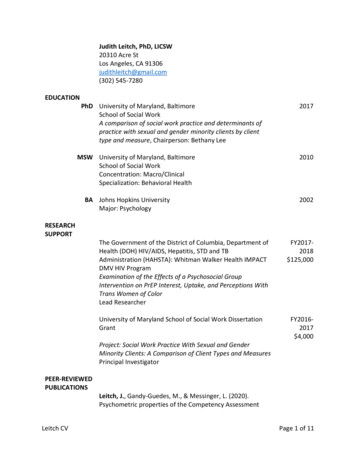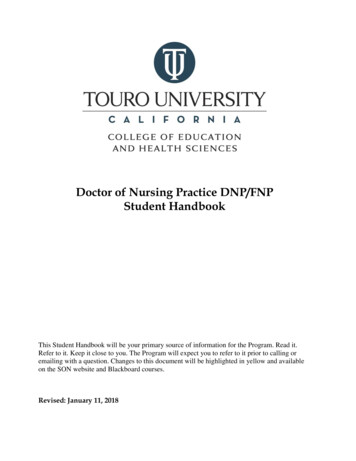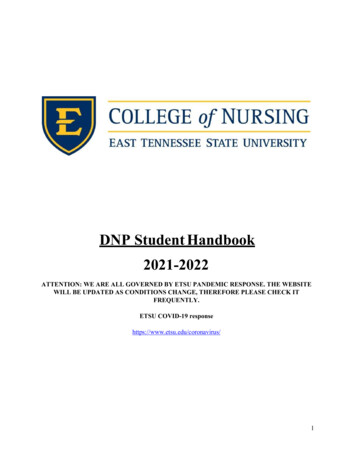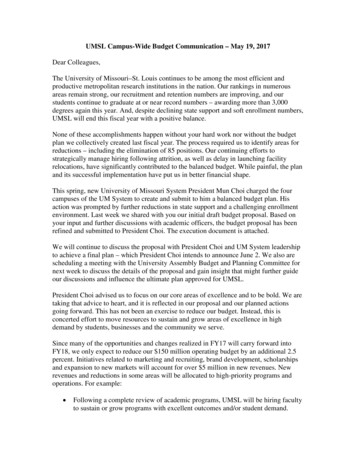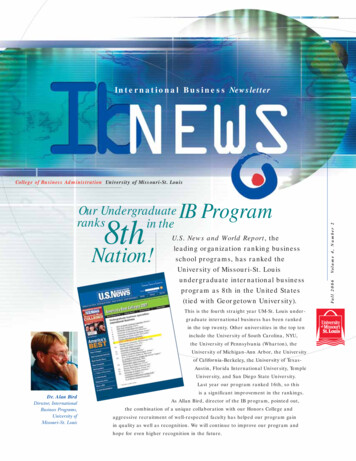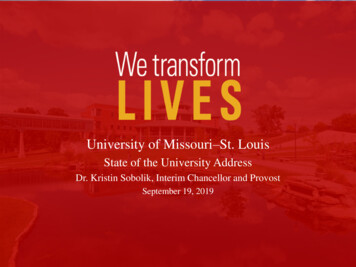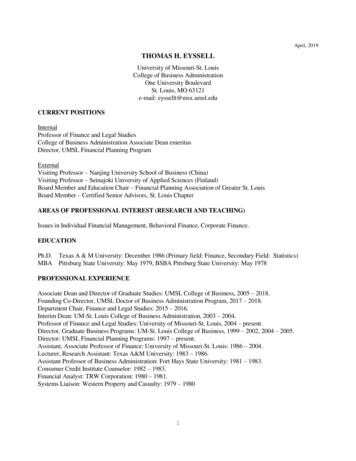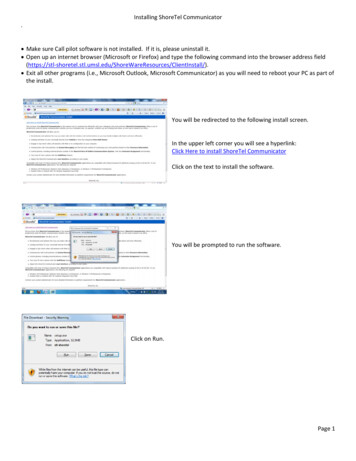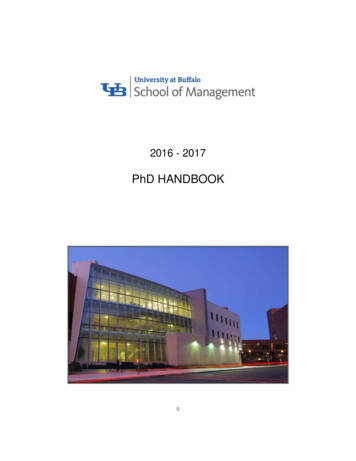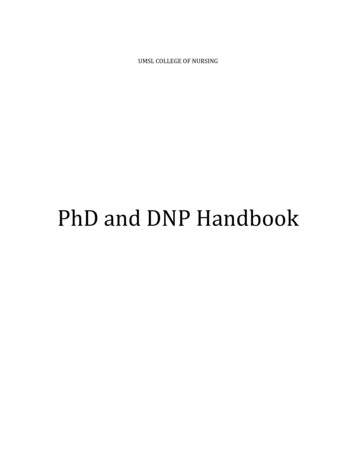
Transcription
UMSL COLLEGE OF NURSINGPhD and DNP Handbook
Contents Overviewo Introductiono History The University The Collegeo Missiono Core Valueso Vision 2012o College of Nursing Philosophyo College Governanceo College Committeeso Student Participationo Missouri Nurse Practice Act Missouri Revised Statutes Section 335.346 Missouri Revised Statutes Section 335.066Student Policieso Non-discriminationo Center for Student Successo Academic Dishonestyo College of Nursing Statement on Academic Integrityo Grading and Grading Scaleo Grade Appealo Grievance Concerning Discriminationo Grievance Concerning Other Issueso Students with Special NeedsGeneral Student Informationo Change of Name, Address or Telephoneo Communicationso Computer Technology/Student Laboratorieso E-Mail/Internet Access/Passwordo Faculty Offices and Mailboxeso Identification Cardo Libraryo Parkingo Transportation
Student Organizationso UMSL Alumni Associationo Sigma Theta TauScholarships and Awardso Student Financial Aido Graduation Awardso HRSA Traineeshipso Nurse Faculty Loan Programo Missouri Nurse Loan Programo National Health Services CorpsUMSL Graduate School Doctoral Degrees in Nursing Graduate Nursing Faculty Admission to Candidacy Candidacy to 'Hood' Senior Student Advisoro Graduate School Policieso Doctoral Student Formso Graduate Assistantshipso Residency Requiremento Continuous EnrollmentDoctor of Nursing Practiceo DNP Program Objectiveso DNP Aggregate Student Outcomeso DNP Curriculum Sample Plan of Study Course Descriptionso DNP Student Academic Committees Comprehensive Examination Committee Clinical Scholarship Project Committee DNP Clinical Scholarship Policy Clinical Scholarship Project Outlineo DNP Comprehensive Exam Guidelineso DNP Clinical Scholarship Project Guidelines
PhD in Nursingo PhD in Nursing Program Objectiveso PhD in Nursing Aggregate Student Outcomeso PhD in Nursing Curriculum Sample Plan of Study Course Descriptionso PhD Student Academic Committees Comprehensive Examination Committee Dissertation Committeeo PhD Comprehensive Examo Dissertation GuidelinesUMSL Institutional Research Board (IRB)o College of Nursing IRB PoliciesNational Guidelines in Nursing
OverviewIntroductionYour doctoral education is guided by policies of the UMSL Graduate School. Graduate Schoolpolicies must be followed because the UMSL Graduate School awards your doctoral degree.Many of these policies and procedures are tailored to meet the need of doctoral students inCollege of Nursing. This Doctoral Student Handbook provides links to these policies andincludes additional college-related guidelines. All doctoral students in nursing first completetheir program-specific coursework. This is followed by a comprehensive examination that isdesigned to assess your readiness to complete your doctoral research project. You will prepare awritten proposal and present it to your peers and faculty. Your proposal, after IRB approval, isimplemented and your findings are also presented to your peers and faculty. Your doctoralstudies are completed after the dissertation is approved and published. For PhD students, thisculminating project is referred to as the student's dissertation and for DNP students it is referredto as the clinical scholarship project. The focus of these degree-specific documents is specifiedunder the headings for each of our doctoral programs.HistoryThe University of Missouri SystemThe University of Missouri is a public university system (System) consisting of four campuses :the University of Missouri-Columbia (UMC), the University of Missouri-Kansas City (UMKC),Missouri University of Science and Technology at Rolla, and the University of Missouri-St.Louis (University). The System was established in 1839 and today enrolls more than 64,000students on the four campuses. It is considered a public, land grant, Research University whosemission focuses on education, research, service, and economic development to serve peoplethroughout the state and beyond.The University of Missouri St. LouisThe University, established in 1963, is the newest of the four campuses. In addition to its missionto advance knowledge as part of a comprehensive research university, this University has aspecial mission determined by its urban location and shared land-grant tradition. The Universityworks in partnership with other community institutions to help the St. Louis region progress andprosper. Through its eight schools and colleges, the campus provides opportunities for people ofthe metropolitan area, including the economically disadvantaged, to receive high quality andaccessible liberal arts, career, professional, and graduate education. More than 15,500 studentsare enrolled at the University, and over 1,400 full- and part- time faculty members are employed.The campus includes over 70 buildings on 350 acres. Bifurcated by Natural Bridge Road, northcampus includes the Colleges of Arts and Sciences, Fine Arts and Communications, Business,the Graduate School, and the Division of Continuing Education. South campus includes theColleges of Nursing, Education, Optometry, and the School of Social Work. It is important tonote that the University is the only public doctoral degree granting research four-year institution
in the St. Louis metropolitan area. More specifically, it is the only public four-year institutionoffering baccalaureate, masters and doctoral education in nursing.The University of Missouri St. Louis College of NursingFounded in 1981, the College of Nursing (College) is one of eight academic colleges and schoolsat the University. The administration, faculty, and staff of the College hold themselvesresponsible for promoting the University’s mission of excellence in teaching, research, andservice. The College also has a long history of cooperative relationships with the two otherschools of nursing in the System and with clinical and community health agencies in the St.Louis metropolitan area. The Colleges first degree program was the RN-BSN program. Thisprogram provided registered nurses with diploma or associate degrees an opportunity tocomplete the coursework necessary to earn a Baccalaureate of Science in Nursing degree.In 1993, the University received independent degree granting authority for the Masters ofScience in Nursing degree program following several years of participation in a cooperativeMSN program with the UMKC School of Nursing. The current MSN degree program maintainsa cooperative relationship with UMKC and UMC; however, the University awards the MSNdegree to students enrolled in its own program. Currently, MSN students can enroll in the nurseeducator option which includes a focus on advanced nursing practice; or students may choose toenroll in a nurse practitioner option which includes emphases on family, adult, pediatric,neonatal, or women’s health. In spring 2007, the College had undergone an internal five yearreview in which one of the recommendations was to reduce the number of programs offered tobetter utilize faculty time and expertise. Although the College is currently approved for a clinicalnurse specialist emphasis area and a nurse leader (administration) emphasis area, admissionshave been suspended for these two areas in response to this recommendation. Graduate facultymembers plan to reassess these emphasis areas in the near future to determine if demand issufficient.In 1993, a proposal was made for a merger between Barnes College of Nursing and theUniversity. Barnes College (BC), a single purpose degree-granting institution associated withBarnes Hospital, offered a generic baccalaureate nursing degree. The merger was approved bythe Missouri State Board of Nursing and the Missouri Coordinating Board of Higher Education.Student policies, records, and admission procedures were transferred to University services. BCfaculty members were offered University faculty appointments. Both faculties of the two collegeprograms combined to form cooperative committees to address organizational and proceduralissues related to the merger.In 1994, the merger was completed and the new program was named the Barnes College ofNursing at UM- St. Louis. For the 1994-95 academic year, operations and location of the prelicensure BSN program continued on the BC campus. Students were officially enrolled at UMSLand received access to all services offered by the University. Students took nursing courses at theBC facilities and general education courses on the UMSL campus. In fall 1995, all aspects of thepre-licensure program were relocated to the University’s campus. By that time, the BarnesCollege of Nursing had begun offering a cooperative PhD program with the UMC and UMKCschools of nursing. Each awarded individual degrees but had a common curriculum, making it
easier to share courses. Although the curricula now differ, collaborative efforts have beenmaintained through selected shared courses and faculty member’s participation on doctoralstudent committees across the campuses.In 2005, Barnes-Jewish Hospital exercised the option to withdraw from the Universitypartnership and reclaim the name Barnes. The current nursing education program is nowdesignated as the College of Nursing at the University of Missouri St. Louis. In 2008, theCollege offered a Doctor of Nursing Practice program supported, in part, by an Advanced NurseEducation Training Grant from the Bureau of Health Professions, Health Resources ServicesAdministration. The program began with six students as a post-master’s program and will beevaluated for initial CCNE accreditation in Fall 2010.In May 2009, the Missouri state legislature, concerned with the continuing shortage of healthprofessionals in the state, approved nearly 40 million dollars for use by public communitycolleges and universities for one time expansions of selected health professions programs. Overthe next two years, the College will receive 1,766,000 to fund an expansion of the pre-licensureBSN option by 16 students, the MSN program by 10 students, and the PhD program by 5students. The initiative is known as Caring for Missourians.The College has been continuously accredited since 1983. The College was first accredited bythe National League for Nursing. In 1998, the College sought accreditation from the Commissionfor Collegiate Nursing Education and received full accreditation in 1999. In 2010, CCNEapproved the College for continuing accreditation of the baccalaureate and master’s degreeprograms through 2020. The Doctor of Nursing Practice program, initiated in 2007, will bereviewed for accreditation in Fall, 2010. The pre-licensure BSN option is fully approved by theMissouri State Board of Nursing through 2014. The pediatric nurse practitioner emphasis area isapproved by the Pediatric Nursing Certification Board through 2014. The neonatal nursepractitioner and women’s health nurse practitioner emphasis areas are approved by the NationalCertification Corporation.Retrieved May 1, 2010 from http://www.umsystem.edu/Retrieved May 1, 2010 from http://www.umsl.edu/about/index.html
Missouri Nurse Practice ActThe State of Missouri Nurse Practice Act governs the practice of professional nurses in Missouri.Section 335.066 pertains to refusal to issue or revocation of license. It is important that studentsbecome familiar with this section of the Act. In Missouri, refer to sections 335.066 and .asp
Missouri Revised StatutesChapter 335NursesSection 335.046August 28, 2007License, application for--qualifications for, fee--hearing on denial of license.335.046. 1. An applicant for a license to practice as a registered professional nurse shall submitto the board a written application on forms furnished to the applicant. The original applicationshall contain the applicant's statements showing the applicant's education and other suchpertinent information as the board may require. The applicant shall be of good moral characterand have completed at least the high school course of study, or the equivalent thereof asdetermined by the state board of education, and have successfully completed the basicprofessional curriculum in an accredited or approved school of nursing and earned a professionalnursing degree or diploma. Each application shall contain a statement that it is made under oathor affirmation and that its representations are true and correct to the best knowledge and belief ofthe person signing same, subject to the penalties of making a false affidavit or declaration.Applicants from non-English-speaking lands shall be required to submit evidence of proficiencyin the English language. The applicant must be approved by the board and shall pass anexamination as required by the board. The board may require by rule as a requirement forlicensure that each applicant shall pass an oral or practical examination. Upon successfullypassing the examination, the board may issue to the applicant a license to practice nursing as aregistered professional nurse. The applicant for a license to practice registered professionalnursing shall pay a license fee in such amount as set by the board. The fee shall be uniform forall applicants. Applicants from foreign countries shall be licensed as prescribed by rule.2. An applicant for license to practice as a licensed practical nurse shall submit to the board awritten application on forms furnished to the applicant. The original application shall contain theapplicant's statements showing the applicant's education and other such pertinent information asthe board may require. Such applicant shall be of good moral character, and have completed atleast two years of high school, or its equivalent as established by the state board of education,and have successfully completed a basic prescribed curriculum in a state-accredited or approvedschool of nursing, earned a nursing degree, certificate or diploma and completed a courseapproved by the board on the role of the practical nurse. Each application shall contain astatement that it is made under oath or affirmation and that its representations are true and correctto the best knowledge and belief of the person signing same, subject to the penalties of making afalse affidavit or declaration. Applicants from non-English-speaking countries shall be requiredto submit evidence of their proficiency in the English language. The applicant must be approvedby the board and shall pass an examination as required by the board. The board may require byrule as a requirement for licensure that each applicant shall pass an oral or practical examination.Upon successfully passing the examination, the board may issue to the applicant a license topractice as a licensed practical nurse. The applicant for a license to practice licensed practical
nursing shall pay a fee in such amount as may be set by the board. The fee shall be uniform forall applicants. Applicants from foreign countries shall be licensed as prescribed by rule.3. Upon refusal of the board to allow any applicant to sit for either the registered professionalnurses' examination or the licensed practical nurses' examination, as the case may be, the boardshall comply with the provisions of section 621.120, RSMo, and advise the applicant of his orher right to have a hearing before the administrative hearing commission. The administrativehearing commission shall hear complaints taken pursuant to section 621.120, RSMo.4. The board shall not deny a license because of sex, religion, race, ethnic origin, age or politicalaffiliation.(L. 1975 S.B. 108 8, A.L. 1981 S.B. 16, A.L. 1995 S.B. 452, A.L. 1999 H.B. 343)Copyright Missouri General Assembly
Missouri Revised StatutesChapter 335NursesSection 335.066August 28, 2007Denial, revocation, or suspension of license, grounds for, civil immunity for providinginformation--complaint procedures.335.066. 1. The board may refuse to issue or reinstate any certificate of registration or authority,permit or license required pursuant to chapter 335 for one or any combination of causes stated insubsection 2 of this section or the board may, as a condition to issuing or reinstating any suchpermit or license, require a person to submit himself or herself for identification, intervention,treatment, or rehabilitation by the impaired nurse program as provided in section 335.067. Theboard shall notify the applicant in writing of the reasons for the refusal and shall advise theapplicant of his or her right to file a complaint with the administrative hearing commission asprovided by chapter 621, RSMo.2. The board may cause a complaint to be filed with the administrative hearing commission asprovided by chapter 621, RSMo, against any holder of any certificate of registration or authority,permit or license required by sections 335.011 to 335.096 or any person who has failed to renewor has surrendered his or her certificate of registration or authority, permit or license for any oneor any combination of the following causes:(1) Use or unlawful possession of any controlled substance, as defined in chapter 195, RSMo, oralcoholic beverage to an extent that such use impairs a person's ability to perform the work ofany profession licensed or regulated by sections 335.011 to 335.096;(2) The person has been finally adjudicated and found guilty, or entered a plea of guilty or nolocontendere, in a criminal prosecution pursuant to the laws of any state or of the United States, forany offense reasonably related to the qualifications, functions or duties of any professionlicensed or regulated pursuant to sections 335.011 to 335.096, for any offense an essentialelement of which is fraud, dishonesty or an act of violence, or for any offense involving moralturpitude, whether or not sentence is imposed;(3) Use of fraud, deception, misrepresentation or bribery in securing any certificate ofregistration or authority, permit or license issued pursuant to sections 335.011 to 335.096 or inobtaining permission to take any examination given or required pursuant to sections 335.011 to335.096;(4) Obtaining or attempting to obtain any fee, charge, tuition or other compensation by fraud,deception or misrepresentation;(5) Incompetency, misconduct, gross negligence, fraud, misrepresentation or dishonesty in theperformance of the functions or duties of any profession licensed or regulated by sections335.011 to 335.096;(6) Violation of, or assisting or enabling any person to violate, any provision of sections 335.011to 335.096, or of any lawful rule or regulation adopted pursuant to sections 335.011 to 335.096;
(7) Impersonation of any person holding a certificate of registration or authority, permit orlicense or allowing any person to use his or her certificate of registration or authority, permit,license or diploma from any school;(8) Disciplinary action against the holder of a license or other right to practice any professionregulated by sections 335.011 to 335.096 granted by another state, territory, federal agency orcountry upon grounds for which revocation or suspension is authorized in this state;(9) A person is finally adjudged insane or incompetent by a court of competent jurisdiction;(10) Assisting or enabling any person to practice or offer to practice any profession licensed orregulated by sections 335.011 to 335.096 who is not registered and currently eligible to practicepursuant to sections 335.011 to 335.096;(11) Issuance of a certificate of registration or authority, permit or license based upon a materialmistake of fact;(12) Violation of any professional trust or confidence;(13) Use of any advertisement or solicitation which is false, misleading or deceptive to thegeneral public or persons to whom the advertisement or solicitation is primarily directed;(14) Violation of the drug laws or rules and regulations of this state, any other state or the federalgovernment;(15) Placement on an employee disqualification list or other related
programs combined to form cooperative committees to address organizational and procedural issues related to the merger. . College of Nursing had begun offering a cooperative PhD program with the UMC and UMKC schools of nursing. Each awarded in
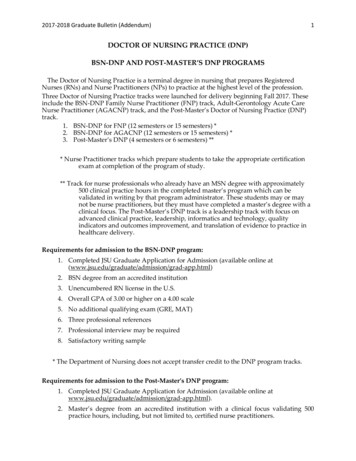
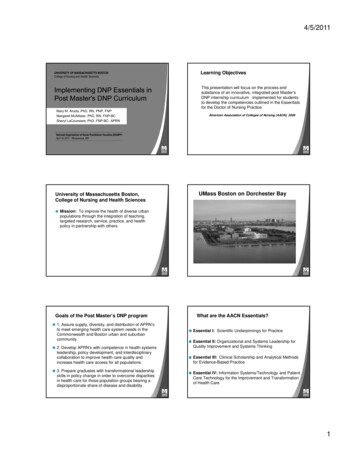
![ACCOUNTING HANDBOOK 2014-2015[2] - UMSL](/img/6/handbk.jpg)
